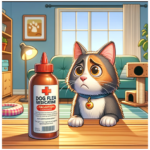Cats, with their mysterious and independent nature, often hide their discomforts and illnesses. As loving pet owners, it’s crucial to be vigilant about their health. One of the most serious conditions that can affect our feline friends is cancer. Early detection can significantly improve the chances of successful treatment and increase the quality of life for our pets. In this blog post, we’ll explore the early warning signs of feline cancer and emphasize the importance of an early diagnosis.
Understanding Feline Cancer
Cancer in cats is not as common as in dogs, but it does occur. The most frequent types of cancer in cats include lymphoma, squamous cell carcinoma, and mammary gland tumors. The causes of cancer in cats are multifactorial and can include genetic predispositions, environmental factors, and viral infections like the feline leukemia virus (FeLV).
Early Warning Signs of Feline Cancer
- Unexplained Weight Loss
- One of the most common signs of cancer in cats is sudden and unexplained weight loss. If your cat is losing weight despite maintaining a regular diet, it’s important to seek veterinary advice.
- Lumps and Bumps
- Any new lumps or bumps on your cat’s body should be taken seriously. While not all lumps are cancerous, they warrant a veterinary examination to rule out malignancy.
- Changes in Eating Habits
- A decrease or increase in appetite, difficulty eating, or a sudden aversion to previously loved foods can be indicators of oral cancers or other internal issues.
- Persistent Vomiting or Diarrhea
- Chronic gastrointestinal problems can sometimes be a sign of cancer affecting the digestive system. Persistent vomiting or diarrhea should not be ignored.
- Sores That Do Not Heal
- Non-healing sores or wounds can be a sign of skin cancer. If your cat has a sore that doesn’t seem to be improving, it’s time for a vet visit.
- Difficulty Breathing
- Labored breathing, coughing, or sneezing can be indicative of lung cancer or lymphoma affecting the respiratory system.
- Behavioral Changes
- Noticeable changes in behavior, such as increased lethargy, hiding, or irritability, can be signs that your cat is in pain or discomfort.
- Unusual Odors
- Foul odors from your cat’s mouth, ears, or other parts of the body can sometimes indicate cancer. Oral cancers, in particular, can cause bad breath.
- Swollen Lymph Nodes
- Enlarged lymph nodes can be a sign of lymphoma. Regularly check your cat’s neck, armpits, and groin for any unusual swelling.
- Difficulty Urinating or Defecating
- Straining to urinate or defecate, or changes in urination patterns, can be signs of cancers affecting the bladder or bowel.
The Importance of Early Diagnosis
Early diagnosis of feline cancer can significantly improve treatment outcomes. Here’s why it’s crucial:
- Improved Prognosis: Early-stage cancers are often more treatable and manageable compared to advanced stages. Early intervention can lead to better outcomes and longer survival times.
- Quality of Life: Detecting cancer early allows for more effective pain management and treatment options that can enhance your cat’s quality of life.
- Less Invasive Treatments: Early-stage feline cancer might be treated with less aggressive methods, reducing the stress and side effects associated with treatment.
- Cost-Effectiveness: Treating cancer early can often be less expensive than addressing advanced cancer, which might require more complex and costly treatments.
What to Do if You Suspect Cancer
If you notice any of the early warning signs of feline cancer mentioned above, don’t panic, but do take action:
- Schedule a Vet Visit: Contact your veterinarian immediately for a thorough examination. Describe the symptoms you’ve observed in detail.
- Diagnostic Tests: Your vet may recommend various diagnostic tests such as blood work, X-rays, ultrasounds, or biopsies to determine if your cat has cancer.
- Discuss Treatment Options: If your cat is diagnosed with cancer, your vet will discuss treatment options, which may include surgery, chemotherapy, radiation therapy, or palliative care.
- Seek a Specialist: In some cases, it may be beneficial to consult a veterinary oncologist, a specialist in cancer treatment for pets.
Preventive Measures
While not all cancers can be prevented, there are steps you can take to reduce the risk:
- Regular Check-Ups: Regular veterinary check-ups can help detect early signs of cancer and other illnesses. Annual or bi-annual exams are recommended, especially for senior cats.
- Healthy Diet: Provide a balanced and nutritious diet to support your cat’s overall health and immune system.
- Vaccinations: Ensure your cat is up-to-date with vaccinations, particularly against FeLV and FIV (feline immunodeficiency virus).
- Environmental Safety: Reduce exposure to carcinogens by keeping your cat indoors or in a controlled outdoor environment, and avoid using harmful chemicals in and around your home.
Conclusion
Being attentive to the early warning signs of feline cancer and acting promptly can make a significant difference in your pet’s health and longevity. Regular veterinary visits, a healthy lifestyle, and early intervention are key to managing and potentially overcoming cancer. Remember, your veterinarian is your best ally in keeping your feline friend healthy and happy.
For more information on feline health and wellness, visit homewithcats.com.
Want more information on this important topic
Check out this excellent YouTube Playlist: Pet Owners Guide To Cancer made in cooperation with Cornell University College of Veterinary Medicine
By staying informed and proactive, we can ensure our beloved cats live long, healthy, and comfortable lives.







I am always searching online for tips that can help me. Thank you!
Really nice post.